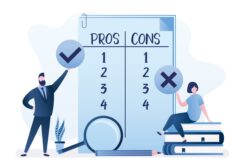When it comes to relationship transitions, understanding the nuances between divorce and legal separation can be crucial. These legal processes offer distinct paths for couples facing challenges in their marriages. Let’s take a comprehensive look at both options to help you navigate this complex terrain with clarity and confidence.
Legal separation: Taking a breather
Legal separation offers couples the opportunity to hit the pause button on their marriage while still maintaining their legal status. Here’s a closer look at what legal separation entails:
- Status Quo with a Twist: Legal separation allows couples to live apart while remaining legally married. This means that despite physical separation, the marriage is still recognized by law, affording certain rights and responsibilities to both parties.
- Space to Reflect: Unlike divorce, legal separation offers couples the opportunity to take a breather and assess their relationship without permanently ending it. It’s like hitting pause on the marriage, giving each spouse time to reflect on their feelings and the future of the relationship.
- Financial Considerations: Just because you’re living apart doesn’t mean financial matters go out the window. During legal separation, couples may need to address the division of assets and debts. While this process may be less final than in divorce, it’s still an essential aspect to consider.
- Parental Responsibilities: If children are involved, legal separation requires couples to establish arrangements for custody and support. These arrangements may be temporary, providing a framework for co-parenting while the couple navigates their separation.
- Flexibility and Benefits: One of the advantages of legal separation is its flexibility. Couples can tailor their arrangements to suit their needs and circumstances, whether it’s maintaining healthcare benefits, preserving certain financial assets, sharing a pet, or simply taking time to reassess the relationship.
- Emotional and Legal Support: Navigating a legal separation can be emotionally and legally complex. Seeking guidance from legal professionals and therapists can provide invaluable support during this time, helping couples make informed decisions and navigate the process with clarity and confidence.
Divorce: Embrace new beginnings
Divorce marks the end of a marital union, granting both parties the freedom to move forward independently. While it signifies the conclusion of one chapter, it also holds the promise of new beginnings. Here’s what you need to know about divorce:
- Finality: Unlike legal separation, divorce terminates the marital relationship entirely. Once the divorce is finalized, both parties are free to remarry or start anew.
- Asset Division: Divorce involves the equitable division of marital assets and debts. This process can be complex and may require negotiation or mediation to reach a fair resolution.
- Child Custody and Support: Similar to legal separation, divorce requires arrangements for child custody and support. These arrangements are formalized as part of the divorce decree, prioritizing the well-being of the children involved.
- Embracing New Opportunities: Despite the emotional challenges, divorce offers a fresh start and the opportunity for personal growth. It’s a chance to rediscover oneself and create the life envisioned.
Choosing your path forward
Whether you’re considering legal separation or divorce, it’s essential to approach the decision with clarity and compassion. Each option carries its own set of implications and considerations, and there is no one-size-fits-all solution. Remember, every end can be a new beginning, filled with promise and potential.





